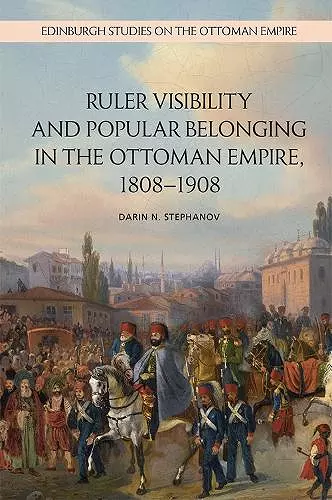Ruler Visibility and Popular Belonging in the Ottoman Empire, 1808-1908
Format:Hardback
Publisher:Edinburgh University Press
Published:16th Nov '18
Should be back in stock very soon

This book explores how annual royal birthday and accession-day celebrations in the Ottoman Empire influenced loyalty to the monarch and contributed to the emergence of ethnic consciousness and national movements.
Ruler Visibility and Popular Belonging in the Ottoman Empire, 1808-1908 explores the significant impact of royal celebrations on the lives of individuals within the empire. The author highlights how annual events, such as the royal birthday and accession-day celebrations, served as a ceremonial intrusion into the daily routines of the populace. These occasions not only marked the presence of the monarch but also created a unique connection between the ruler and his subjects, fostering a sense of loyalty that transcended various divides, including language, location, creed, and class.
The book delves into the dual nature of these celebrations. While they reinforced vertical ties of allegiance to the monarch, they also inadvertently contributed to the emergence of horizontal connections among different ethnic groups. The author argues that the communal experiences during these festivities played a pivotal role in the development of ethnic consciousness, which later became a catalyst for national movements. This transformation was particularly significant in the context of the empire's eventual decline and the rise of national monarchies.
Ultimately, the work invites readers to reconsider the complexities of loyalty and identity within the Ottoman Empire. By examining these ceremonial practices, the author sheds light on how they shaped social dynamics and contributed to the broader narrative of nationalism in the region. Through this lens, the book offers valuable insights into the interplay between ruler visibility and popular belonging, enriching our understanding of Ottoman history during a transformative century.
The book provides fresh avenues to appreciate the evolution of social solidarity within the diverse Ottoman world. [...]Those interested in the formation of ethnonational consciousness in the Ottoman successor states (Bulgaria in particular), will profit from this original study. -- Lucien Frary * Ab Imperio *
This original study provides much food for thought on the ‘unintended consequences’ of a variety of ethno-nationalisms, including the ubiquitous personality cult within and outside the Ottoman/post-Ottoman orbit. Thus, this book will interest readers who are concerned about the growing prevalence of ethno-nationalism in the post-Cold War world and who hope to devise countervailing solutions before it is too late. * Suraiya Faroqhi, Ibn Haldun University *
[...] the book constitutes an important contribution to the study of Ottoman and Balkan modernity. Stephanov has convincingly illustrated that the evolution of ruler visibility policies and royal ceremonies was a barometer of sociopolitical and sociocultural change in the late Ottoman Empire. -- Andreas Lyberatos * Turkish Historical Review *
Stephanov makes a very convincing case for the importance of monarchical institutions in bridging late imperial and early national contexts through the application of a highly original approach to the study of the Ottoman dynasty. -- Arlen Wiesenthal, University of Chicago * Kadim *
ISBN: 9781474441414
Dimensions: unknown
Weight: 516g
256 pages